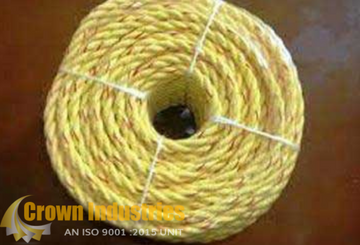When you think of industrial power grip ropes, you will find two leading production materials: Polypropylene and polyester. Both are synthetic elements that are useful in making ropes for industrial use. These materials are durable and strong and can be used in numerous fields.

More about the Two Materials:
Both polyester and polypropylene share some similar attributes. However, they have many contrasting properties. These make them different from one another. The chemical composition is a determining factor between the two. It makes these two ropes different from one another.
Key Differences between Polyester and Polypropylene:
This blog conducts a comparative study between the two materials for producing ropes. One can learn about the elements that determine the preferences of power grip ropes manufacturers.
- Absorption of Moisture: Polyester is highly resistant to water. However, it can absorb moisture particles. On the other hand, polypropylene ropes are extremely hydrophobic. They are unable to absorb any moisture. For this reason, the latter is a primary choice for manufacturing industrial-grade power grip ropes. Even if a polypropylene rope remains exposed to heavy rain, it can dry out faster than polyester.
- Durability: Both polyester and polypropylene are known for their durability. However, their compositions make them different from one another. Both ropes can withstand inclement weather conditions. They can remain in good condition for years. However, using polypropylene ropes in areas of high heat is not a good idea.
- Texture: The sturdiness and thickness of the elements depend on their mixture with other materials. Without mixture, polypropylene is usually a lightweight fabric. This is why it can be used to make heavy-duty industrial ropes. Compared to propylene, polyester is a much more dense material.
- Colouring Properties: It is common to notice coloured ropes made from polyester and polypropylene. The procedure for colouring the ropes are different from one another. Polypropylene ropes have to be dyed during their production stage. Its non-absorbent properties make it unable to dye later on. One can apply colours to polyester ropes after production. They will require synthetic dye and additional heat application.
These are the distinctive properties between polypropylene and polyester ropes. These make both a smart option among the power grip ropes manufacturers. One may consult Crown Industries to obtain sturdy industrial-grade power grip ropes. They are a well-known source that manufactures quality polypropylene ropes in bulk. One can buy these ropes for application in a wide sector of industries. For more details, one may visit their website.
